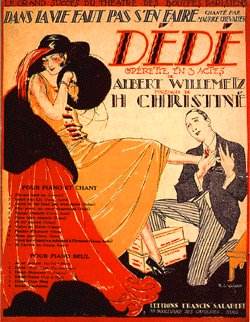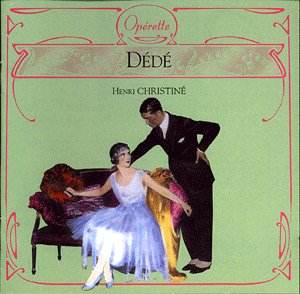
This rare recording of Dédé comes as part
of an Operette series of re-releases from Universal France. Max
de Rieux initiated this series of recordings of the 1950s and
1960s to provide a testament to a forgotten age. Today's CD catalogue
contains only two songs by Christiné and nothing else.
Along with Phi-Phi, this release is welcomed. The Traubner
book on Operetta speaks well of Christiné who introduced
to Paris a new form of operetta-revue or musical. Dédé
is characteristic of the style of Twenties stage shows.
Henri Christiné spent a lot of
his adult life in France yet was a native of Switzerland. He was
born in Geneva, the son of a watchmaker. An interest in music
was developed after marrying a singer from a travelling troupe
which came to Geneva. Christiné wrote chansons for her.
His release from a strict upbringing brought about an interest
in non-conformist material. He moved first to Brussels where he
presented his first operettas and later to Paris where he worked
initially as a conductor. Later he was decorated with the Légion
d'honneur and became Vice-President of the Société
des Auteurs Dramatiques.
Dédé followed the
roaring success of Phi-Phi (recorded in this series, 465
886-2) at the Théâtre des Bouffes-Parisiens three
years later. Christiné had gained the attention of the
theatre-going public with his new style operetta/revue and carried
the formula into the Twenties (known in France as 'The Folie
Years'). Dédé was a hit attraction at
the Bouffes-Parisiens, opening in November 1921.
The action takes place in a Parisian shoe shop
where the creator of the role of Phi-Phi (André Urban)
in the previous Christiné musical stars as the shop manager.
His main shop assistant in 1921 was the young Maurice Chevalier
who here is brought in by Decca to play his old part after a lapse
of 32 years. With his trademark straw-boater (hat) and stage charisma
it is right that he was encouraged to participate in this recording.
The work was brought to London a year following the Paris opening
(with a translation by Ronald Jean), but did not take with the
public. The show was filmed (1934) and enjoyed a successful revival
in the 1970s. The production gets its title from the character
André de la Huchette who is known as Dédé
to his friends. (This fact is not made clear in the cast list
accompanying the notes.)
A long, narrated introduction, some of it over
a musical introduction (1'30") gives production details and might
have been dispensed with. In the original production, Chevalier
brought the house down with its hit number, Pour bien réussir
dans la chaussure (To succeed in selling shoes) [CD 1 tk.12].
To the British, Chevalier is a star one either likes or dislikes.
Known to many from his films, many of which captured a gravelly
voice past its best, he conveyed an engaging presence on stage.
Dédé is charismatically played
by Raymond Girerd with sensuous velvety tone [CD1 tk.8] while
Marina Hotine (Denise) lifts the ambience with a perky brightness
[CD1 tk.3]. Marcel Carpentier as Leroydet is a baritone whose
singing voice has a coarse timbre: fortunately he only sings briefly
at the beginning. His spoken dialogue is very characterful, however.
The production under Jacque-Henri Rys's direction
flows breezily along and the operetta is very clearly recorded,
in fact outstandingly so for 1953. The mono mastering does not
hinder one's enjoyment.
Brief notes in French are provided in the attractive
card case.
Raymond Walker
Other sets in the Accord 'Operette'
series:
Audran, La Mascotte [465 877-2];
Benatzky, L'Auberge du Cheval Blanc
[465 880-2];
Christiné Phi-Phi [465
886-2];
Dumas, Ignace [472 877-2];
Ganne, Les Saltimbanques [465
868-2];
Goublier, La Cocarde de Mimi Pinson
[461 964-2];
Lecocq, La Fille de Madame Angot
[465 883-2] Le Petit Duc [472
874-2];
Lehár, Paganini [472 868-2]
Rose de Noel [472 871-2];
Maillart, Les Dragons de Villars
[472 865-2];
Messager, Véronique [465
864-2];
Offenbach, La Belle Hélène
[461 954-2] La Fille du Tambour Majeur
[461 673-2] La Grande Duchesse de
Gérolstein [465 871-2];
Planquette, Les Cloches de Corneville
[465 861-2];
Strauss, Trois Valses [461 958-2];
Varney, Les Mousquetaires au Couvent
[465 874-2];
Yvain, La-Haut [461 967-2].
Operette
series from Universal Accord reviewed
by Ray Walker
Further reading: "Operetta",
Traubner (Oxford 2003)



